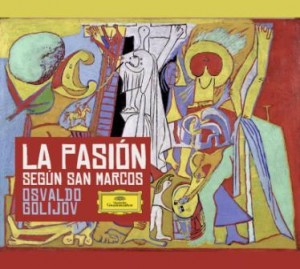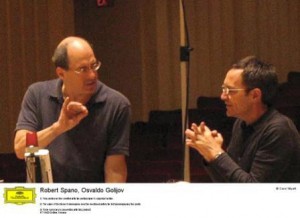 The 15th Other Minds Festival kicks off this evening, offering San Francisco a three-day immersion in contemporary music from around the world. One of the locals headlining this year is Gyan Riley, who’ll premiere his new quartet work commissioned by Other Minds, entitled When Heron Sings Blue.
The 15th Other Minds Festival kicks off this evening, offering San Francisco a three-day immersion in contemporary music from around the world. One of the locals headlining this year is Gyan Riley, who’ll premiere his new quartet work commissioned by Other Minds, entitled When Heron Sings Blue.
Equally well known as a classical guitar virtuoso and as a composer, Gyan will take on his own guitar part in the quartet on the third festival night, joined by his Gyan Riley Trio bandmates Timb Harris (violin & viola) and Scott Amendola (percussion). Electric bassist Michael Manring will complete the quartet.
Concert Three of the Other Minds Festival begins at 8:00 p.m. on Saturday, March 6 at the Jewish Community Center of San Francisco. Full details and tickets are available here.
Gyan naturally had a lot going on this week but I was still able to get a few questions in front of him for the readers of Sequenza21.
S21: How did the quartet instrumentation of When Heron Sings Blue come about? What was it about the piece that wanted an electric bass underpinning, and specifically Michael Manring?
GR: As a guitarist, my early works consisted of primarily solo guitar writing. In the last several years, however, my compositional output has shifted in the direction of ensemble writing. One medium that is particularly enticing to me is that of violin, guitar, and percussion, and I assembled my trio as an ongoing project to satisfy this interest.
There are several reasons why I chose the violin. To begin with, it was my first instrument (I played violin for five years, beginning at age 6). As an element in the ensemble, the two main assets of the violin are the potential to slide between the notes, and the ability to crescendo on a given note (things that the guitar cannot accomplish without electronics). Composing for violin has allowed me to vicariously express these musical desires. Additionally, I’ve learned that these two qualities are wonderfully complimentary to the guitar, creating a uniquely beautiful composite sound.
The other reason that the microtonal possibilities of the violin are important to me is their close association with Indian music, which has been in my ears literally since birth. (As a vocalist, my father has studied North Indian raga for nearly 40 years.) Timb Harris, the violinist in my trio, although classically trained, has long since been fascinated with the music of Eastern Europe, and has traveled extensively in Romania to pursue this interest. One of the reasons I invited him to join this project was his understanding non-Western idiom, and there is an audible and historical connection between the sentiment of Indian music and that of Romania.
Although Scott Amendola’s main instrument is the drum set, using chopsticks, brushes, mallets, and even his hands, and supplementing that with a variety of hand percussion instruments, he creates a plethora of sound unlike that of any other drummer I’ve heard. His breadth of experience and understanding of jazz, avant-garde, and experimental improvisatory idioms contributes a vast array of possibilities to this project.
I have worked with bass guitarist Michael Manring on and off for about two years. He has a unique ability to seamlessly drift in and out of the foreground, occasionally drawing from his vast repertoire of extended techniques, yet always in service of the musical objective. In working with this ensemble, I grew to greatly enjoy the broad timbral spectrum and solid rhythmic foundation that the bass guitar provided—qualities that I now know would be fruitful additions to the existing trio, greatly benefiting our overall sonority. (more…)


 Spring has definitely sprung down here in Houston; everything that looked dead just a few weeks ago is sprouting all kinds of new growth. And that goes for opera as well, seeing that this year’s iteration of
Spring has definitely sprung down here in Houston; everything that looked dead just a few weeks ago is sprouting all kinds of new growth. And that goes for opera as well, seeing that this year’s iteration of  This year’s festival will also include the world premiere of the winning opera from the 2009 Opera Vista Festival, Anorexia Sacra by Line Tjørnhøj. Line couples the plight of a young woman suffering from anorexia with the writings of the 13th century nun Claire of Assisi. Anorexia Sacra will be performed at 7:30pm on March 20th and 27th at the Live Oak Friends Meetinghouse (1318 West 26th Street).
This year’s festival will also include the world premiere of the winning opera from the 2009 Opera Vista Festival, Anorexia Sacra by Line Tjørnhøj. Line couples the plight of a young woman suffering from anorexia with the writings of the 13th century nun Claire of Assisi. Anorexia Sacra will be performed at 7:30pm on March 20th and 27th at the Live Oak Friends Meetinghouse (1318 West 26th Street). I’ve written before about the one and only
I’ve written before about the one and only 




 The 15th Other Minds Festival kicks off this evening, offering San Francisco a three-day immersion in contemporary music from around the world. One of the locals headlining this year is
The 15th Other Minds Festival kicks off this evening, offering San Francisco a three-day immersion in contemporary music from around the world. One of the locals headlining this year is  2009 Frederic A. Juilliard/Walter Damrosch Rome Prize winner
2009 Frederic A. Juilliard/Walter Damrosch Rome Prize winner